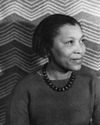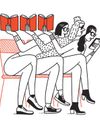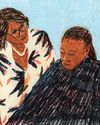
For Émilie du Châtelet, romance and research could be twinned enterprises.
Historians championing previously marginalized intellectual and literary figures are often caught on the horns of an odd dilemma. On the one hand, the subject—the woman scientist, the Black composer, the Indigenous military strategist—must have met with some degree of social acceptance in their day or the work would never have had enough support and attention to have flourished and survived. Since historians wish to draw on the wiser judges of the era to establish the importance of their subjects, we are told about whom they wowed and how they wowed them. On the other hand, the point must be made that such subjects have had far less attention than they deserve. So they must be shown to have been keenly appreciated by the better spirits of their time as well as wrongly consigned to oblivion.
This reflects a historical truth— the marginalized often are esteemed, at least by some, before being neglected by all—but it creates a strange biographer’s two-step. We regret that Louise Farrenc, the French Romantic composer, has fallen into obscurity, while reporting how much her contemporary Hector Berlioz admired her in order to establish the injustice of her obscurity. Isaac Rosenberg might be “the greatest English war poet nobody ’s ever heard of ”—as one of his champions insists, comparing him favorably with Rupert Brooke and Wilfred Owen, and ascribing his oblivion to his being working class and Jewish—but his work’s excellence is established by the fact that Ezra Pound and T. S. Eliot were impressed by it. Vindicated and victimized: this two step is very much on view in “The Enlightenment ’s Most Dangerous Woman: Émilie du Châtelet and the Making of Modern Philosophy” (Oxford), Andrew Janiak’s engrossing life of the French scientist, mathematician, and philosopher.
この記事は The New Yorker の November 04, 2024 版に掲載されています。
7 日間の Magzter GOLD 無料トライアルを開始して、何千もの厳選されたプレミアム ストーリー、9,000 以上の雑誌や新聞にアクセスしてください。
すでに購読者です ? サインイン
この記事は The New Yorker の November 04, 2024 版に掲載されています。
7 日間の Magzter GOLD 無料トライアルを開始して、何千もの厳選されたプレミアム ストーリー、9,000 以上の雑誌や新聞にアクセスしてください。
すでに購読者です? サインイン

MING HAN ONG
Thadeus had never offered to take Johnny Mac out for a meal before. This is new, Johnny Mac says, grinning. For twenty-five years, Johnny Mac worked as a tenant-rights lawyer. He is a fount of varied and surprising knowledge.

ZORA NEALE HURSTON'S CHOSEN PEOPLE
What a long-unpublished novel reveals about her magnificent obsession.

FEAR AND LOATHING
Are all our arguments really over who's harmed?

ODD JOBS
\"Severance,\" on Apple TV+.

ON A MISSION FROM GOD
Inside the movement to redirect billions of taxpayer dollars to private religious schools.

MAKE HIM LAUGH
How Lorne Michaels's sensibility governs \"Saturday Night Live.\"

TABULA RASA
“Bleb” is worth eight points in Scrabble. Thought you might like to know. I have known the word since Wednesday, June 11, 1958, when I learned it from a company physician at Time Incorporated, in Rockefeller Center. He said I should have been hospitalized four days ago, but there was nothing much to do about it now, go back to work.

WELCOME TO OUR FIRST/FINAL BOOK CLUB!
Thank you, everyone, for coming to our first/final book-club meeting. Apologies for how long it's taken us to settle on a date, but in between work, kids, and the pretense of joining adult recreational sports leagues, it seems that we all have incredibly busy schedules.

THE POISON MACHINE
The talk-show host Yinon Magal's hard-line tactics.

MEAN TIME
“Hard Truths.”